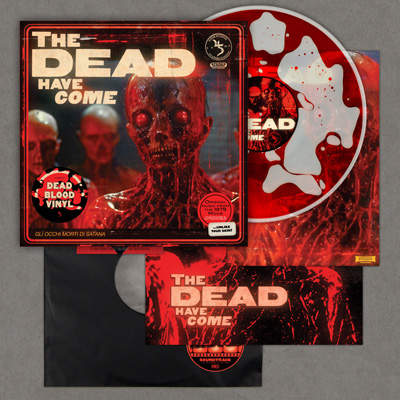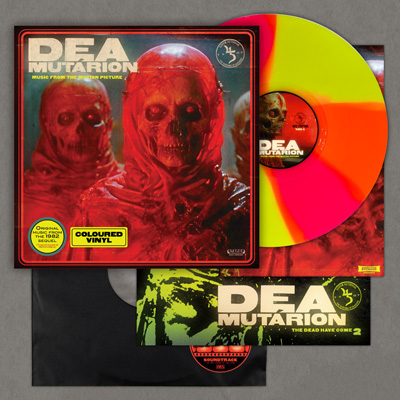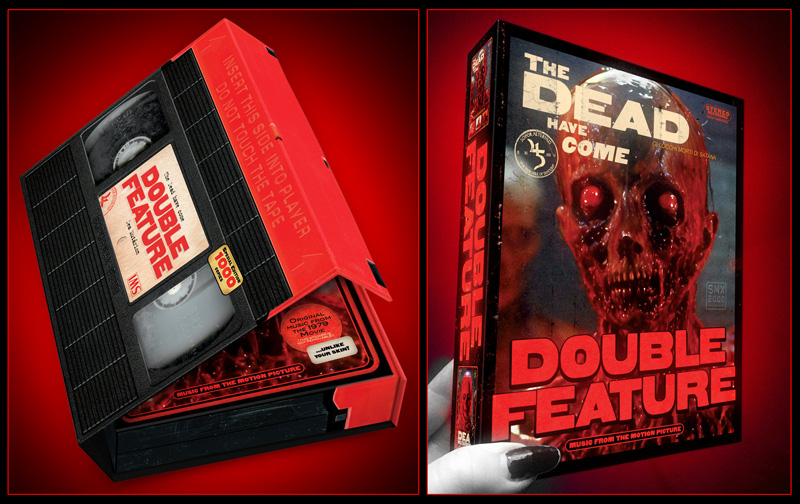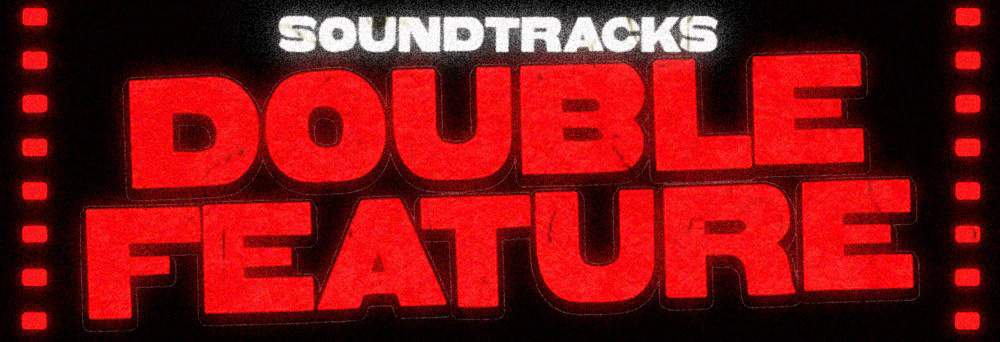

July 25th, 2025
Now, when I say that I have always liked movie soundtracks, I should probably be more precise and use the correct term of film "scores" instead. Because - technically - a soundtrack is literally
everything
you can hear in a movie ... including dialogue, sound-effects and, well, the music (diegetic and non-diegetic). Literally,
all
the sounds of a movie make its "soundtrack".
The "score", on the other hand, is really just the (usually
non-diegetic*
) music.
But somehow I prefer the word "soundtrack" over the term "score", because it just sounds so much more melodic to my German ears. Silly, yes, but that's how it is.
����ЃŠ️
*Non-diegetic means that only we, the audience, can hear it. The characters in the film cannot.
I like soundtracks. I always have. And I like (phantastique) movies. Well, obviously so. As "escapist" as it all may be (well,
is
), I do think that movies are one of the most wonderful inventions ever.
I believe it was Steven Spielberg, who once described film as "chemical magic"; and though that's kind of a different topic altogether, it still beautifully illustrates what I am trying to express, and that is: the
entire
thing is all rather
magical
to me.
There was a brief moment at some point between 1984 and 1985, when I kind of wanted to own the soundtrack records to every single movie I had ever seen. Naturally, I quickly gave up on this ridiculous idea, because there was no way I could even begin to afford it (nor did I have the space for it).
But that is the reason, why I still have copies of mainstream albums like
INDIANA JONES AND THE TEMPLE OF DOOM
(1984) and
GHOSTBUSTERS
(1984) in my record collection.
Urrrgh
...
Though, the latter has the line
"I believe it's magic"
on it, and Mola Ram has always been pretty damn sexy. So, there you go...
... frivolous purchases once again justified. Yay!

It's a bit of a stupid thing to say, but it always kind of seemed to me (before the 2000s that is) that soundtrack releases were somewhat treated like the unloved stepchild of the music industry. From my perspective, it looked like it was only the scores of bigger, mainstream productions that would get a release in the first place, and then it was never the complete score either.
Granted, the music
usually had to fit on a single 12-inch record (because reasons), so it made sense to only put the "highlights" and significant/defining pieces of a score on an album. Besides, the average listener would hardly care for every single miniscule variation of the same theme (or drone) anyway.
And yet...
So many times I had been watching John Carpenter's "
THE FOG
" (1980)
on VHS, and each time the scene came on where the two women drive past the cross next to the road (on their way to the church), I always thought:
"Why is this beautiful piece of music not on the soundtrack album?"
-- So frustrating.
Basil Poledouris' fantastic score for "
CONAN THE BARBARIAN
" (1982) used to be another example of half of the great music you hear in the movie not being on the official soundtrack album, and - for decades - you could only get it on bootlegs (of varying quality).
And, yes ... random sidenote ... when I was little, I, too, was one of those kids, who would record entire movies and TV-series off of the television, by placing a (mono, what else) cassette-recorder in front of the TV-speaker in the livingroom. Gaaaawd, I even snuck a tape-recorder into the cinema once or twice (well, three times, actually), so I could have an audioplay of those movies on cassette to listen to at home.
(Shockingly, I still know most of those dialogues by heart, and yet I cannot remember what I did five minutes ago.)
Once I had (access to) a video recorder, I would connect it to my hifi-system and record soundtrack mix- tapes that way.
Well, a movie soundtrack (or rather "score", as I should say) is music that was specifically written for a movie ... and it only serves
ONE
single purpose:
to highten the audience's connection to what they are seeing on the screen!
Or, to put it in simpler words:
To make you want to watch the movie even more
.
That's it. Nothing else.
(I suppose, this may also explain, why some people have a sort of throw-away attitude towards film scores. Hmm, anyway...)
In essence, there are
two ways
to compose the score for a movie:
1)
you can either "describe" a scene, by literally translating to music all the things that are happening on the screen (oh, hey, that rhymed!) ... or
2)
you can write music that creates more of a general mood or atmosphere.
(And then, of course, there is everything that falls in-between these two, as it is with most things.)
Both approaches are equally valid, because, in the end, it is whatever serves the movie best.
After all,
it's
ALL
about the movie!
Now, while some scores work just GREAT in the service/context of the movie ... on their own, however, they may not necessarily make for what you would call a "pleasurable listening experience". ;)
Like, for example, only recently I had been watching "
THE CAR
" (1977), which is about a black vehicle that is literally a demon from hell, possibly the devil himself, driving around killing people just because. It's silly fun.
Leonard Rosenman's orchestral score works just perfectly for this. It opens with a version of DIES IRAE and then turns into what sounds like ... well ...
traffic noise & car crashes
. It's all very dissonant and unnerving (or just plain annoying), like metal scratching over asphalt, and it beautifully amplifies the terror that is happening on screen. -- It's GREAT. --
But ... would I want to listen to this on its own?
FUCK, NO!
The opposite example to this could be the afore-mentioned soundtrack to "
THE FOG
" by John Carpenter. I cannot even begin to tell you, how often I have been playing this music as a loop in the background. That ... and "
HALLOWEEN III
" (1982).
In fact, "
HALLOWEEN III
" was one of those movies, where I recorded the music off the rental VHS-tape to an audio cassette, because there was no soundtrack release available anywhere (at least not to me). The movie itself I found a little disappointing back then (not because of the missing Michael Myer, though, because
fuck that idiot!
), but ... maaaaaan ... I really liked that music from the first second I heard it. AND I STILL DO. I still listen to the soundtrack on a regular basis.

And now, to finally approach the point of this pointless as usual blog entry:
When it comes to releasing the soundtrack of a movie on physical media, it is pretty much up to whoever produces the release to decide what
exactly
they want to put on it. It can be the complete score, only parts of the score with bits of dialogue and sound-effects inbetween, or just the main theme and maybe the popsong that plays over the end credits.
There really are no rules.
It can be whatever the producers feel will make for the "best" release. It can even be remixed, edited to bits or completely re-recorded.
The same, of course, is twice as true for releasing imaginary soundtracks.
While an engaging
"horror" movie (I don't like that word, by the way, I prefer the term "phantastique") must have more than one note, as in there need to be "action" scenes (for example) that will keep the audience on the edge of their seats, there is no law that says that you have to include these (possibly hectic and/or annoying) pieces of the score on the actual soundtrack release as well. Not, if they are at odds with the rest of the music, and thus ruin what would otherwise be an enjoyable listening experience of a
conherent
atmosphere from beginning to end.
So, yeah ... now that I think about it, a soundtrack album is really
just like
any other music album.

About four years ago, I wanted to listen to the soundtracks of the first three Don Dohler films on CD (well, mainly "
FIEND
", really, from 1980), but those albums didn't exist at the time. So I sat down and edited out the music (with the occasional fitting bits of dialogue) from my copies of the movies and then burned my own soundtrack CD-Rs.
Hmm, I guess, nothing has really changed in that regard.

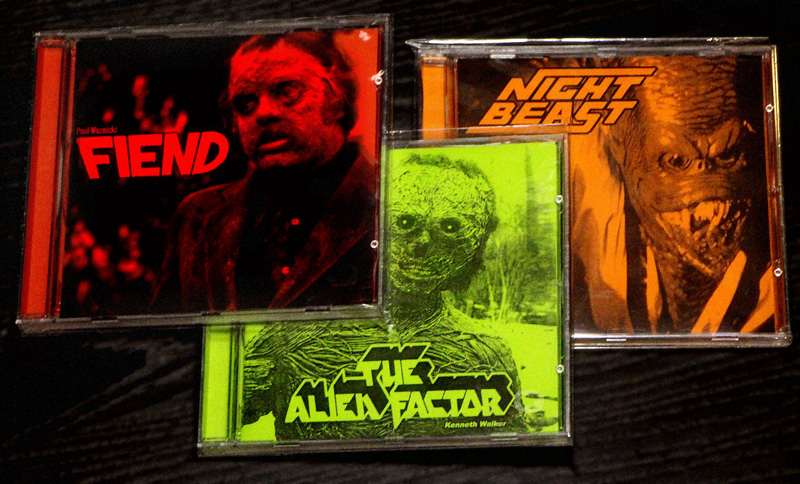
Ignore the rather cheaply looking artwork. Coloured paper is as exciting as it ever gets, because I only have a black & white printer.
Besides, these were meant for my eyes only, anyway
.
Oh, and yes, I do keep
all
of my CDs (and vinyl records, and movies) in protective cellophane sleeves.
As one does!
Anyway, I hope that all this can somehow convey, how very fond I have always been of movies and movie soundtracks.
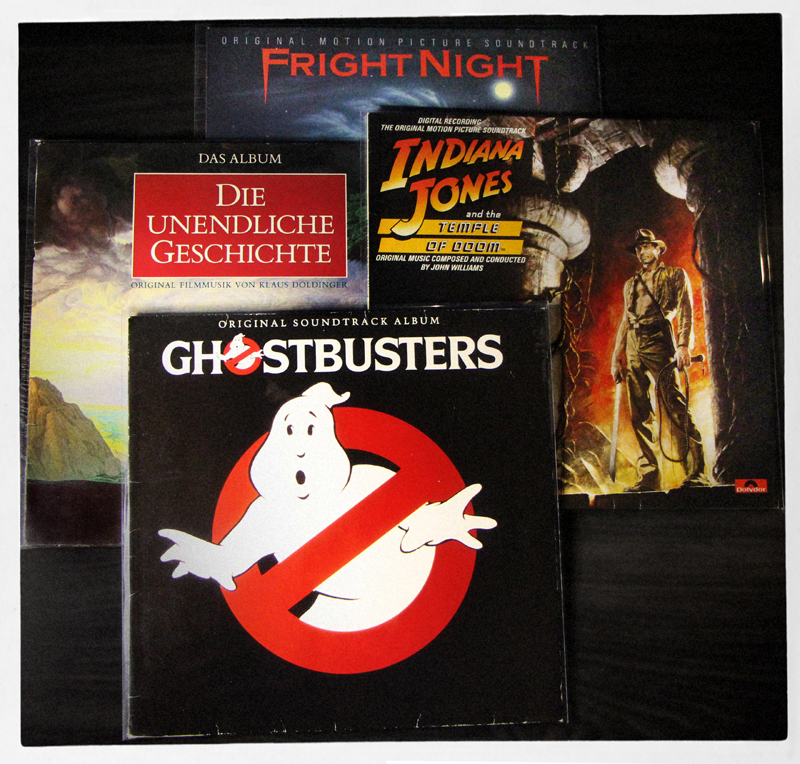
Actually, Klaus Doldinger's original score for "
THE NEVERENDING STORY
" (1984) has some really good moments, and "The Swamps of Sadness" is just a beautiful piece of melancholy. --
"
FRIGHT NIGHT
" (1985) has a wonderfully trashy title track by J. Geils Band, and the Sparks are on this as well.
Honestly, I cannot regret any of these old purchases.


